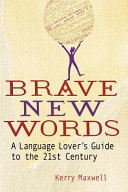

In 'Brave New Words', the author delves into how technology has transformed the way we communicate. The rise of digital platforms has led to the creation of new terminology and phrases that reflect our evolving relationship with technology. The book explores the impact of social media, texting, and online communication on language, highlighting both the positive aspects, such as increased creativity and expression, and the negatives, including the potential for miscommunication and the degradation of traditional language skills. This idea emphasizes the fluidity of language and how it adapts to cultural shifts, urging readers to understand that language is not static but a living entity that morphs with societal changes.
Continue readingThe book discusses the concept that language is not just a tool for communication but also a framework for thought. The author references linguistic relativity, suggesting that the way we express ourselves influences our perceptions and understanding of the world. Through various examples, the text illustrates how specific terms can shape our attitudes towards technology, innovation, and even social issues. By examining the language used in tech discourse, the book encourages readers to be mindful of the words they choose and how these choices can affect their thinking and decision-making processes.
Continue readingAnother key idea presented in 'Brave New Words' is the connection between language and identity. The author argues that language is a powerful marker of personal and cultural identity, particularly in a globalized world where multiple languages and dialects coexist. The book explores how technology facilitates the expression of diverse identities through language, such as the rise of online communities that use specific jargon or slang. This exploration leads to the understanding that language can empower marginalized voices and foster inclusivity, while also posing challenges in terms of cultural appropriation and the preservation of endangered languages.
Continue readingThe author looks ahead to the implications of artificial intelligence on language. With advancements in natural language processing and machine learning, the way we interact with technology is changing. The book raises questions about the future of human language as AI becomes more integrated into our daily lives. Will AI-generated language dilute human expression? Or will it enhance our communication capabilities? This idea invites readers to consider the ethical and societal implications of relying on AI for language-related tasks and to reflect on the potential loss of nuance and emotion in communication.
Continue readingThe book asserts that language can be a powerful instrument for social change. The author illustrates how movements such as feminism, civil rights, and environmentalism have utilized language to rally support and inspire action. By coining phrases and slogans, activists can encapsulate complex ideas into memorable expressions that resonate with the public. This idea emphasizes the importance of language in advocacy and the responsibility that comes with it, urging readers to recognize their own capacity to influence change through the words they choose.
Continue readingIn 'Brave New Words', the author advocates for critical literacy as a means to navigate the complexities of modern communication. With the overwhelming amount of information available online, the ability to critically assess language becomes essential. The book discusses the skills needed to deconstruct messages, understand bias, and recognize the intentions behind language use. This idea encourages readers to develop their critical thinking skills in relation to language, empowering them to become more discerning consumers of information and communicators in their own right.
Continue readingThe final key idea revolves around globalization and its effect on language diversity. The author examines how global communication networks have led to the dominance of certain languages, particularly English, at the expense of others. While globalization facilitates cross-cultural exchange, it also poses a threat to linguistic diversity. The book calls for an awareness of this issue and encourages readers to appreciate and protect linguistic heritage. This idea reinforces the notion that every language carries unique perspectives and knowledge, advocating for the preservation of diverse linguistic traditions in an increasingly homogenized world.
Continue readingThe reading time for Brave New Words depends on the reader's pace. However, this concise book summary covers the 7 key ideas from Brave New Words, allowing you to quickly understand the main concepts, insights, and practical applications in around 22 min.
Brave New Words is definitely worth reading. The book covers essential topics including The Evolution of Language in Technology, The Role of Language in Shaping Thought, The Intersection of Language and Identity, providing practical insights and actionable advice. Whether you read the full book or our concise summary, Brave New Words delivers valuable knowledge that can help you improve your understanding and apply these concepts in your personal or professional life.
Brave New Words was written by Kerry Maxwell.
If you enjoyed Brave New Words by Kerry Maxwell and want to explore similar topics or deepen your understanding, we highly recommend these related book summaries:
These books cover related themes, complementary concepts, and will help you build upon the knowledge gained from Brave New Words. Each of these summaries provides concise insights that can further enhance your understanding and practical application of the ideas presented in Brave New Words.